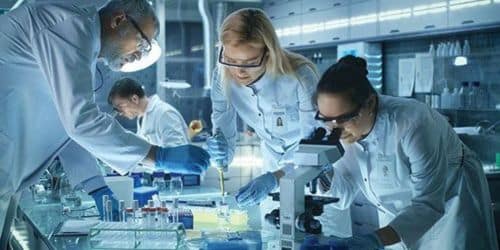A program in clinical laboratory science or certification as a laboratory technician may be a good fit for you if you want to combine chemistry, biology, medicine, and problem-solving in your career. A CLS examines biological samples. They are also referred to as medical technologists or clinical laboratory scientists. They are in charge of analyzing samples using science and informing physicians of the findings. Medical laboratory scientists collaborate closely with doctors, lab technicians, and other healthcare professionals to identify and track disease processes, as well as to evaluate the effectiveness of treatment. In this article, we will examine what a clinical laboratory scientist is, the program to undertake, how to become one, what the duties and qualifications are for the position, and its salary data.
Clinical Laboratory Scientist
The study of how to use clinical laboratory tests to diagnose, categorize, monitor, and treat disease is known as medical laboratory science. Blood, tissue, and bodily fluids can all be chemically analyzed and tested to look for foreign organisms and anomalies. Medical laboratory scientists, also known as medical technologists, are laboratory specialists who work as a multidisciplinary medical team to determine the presence, severity, or absence of disease.
They perform an extensive array of laboratory tests, from simple blood tests to more involved procedures to check for diseases like cancer, coronary artery disease, and diabetes. In the clinical laboratory’s five primary subspecialties—chemistry, immunology, hematology, transfusion medicine, and microbiology—they carry out analyses, evaluations, and validations of laboratory data.
The provision of laboratory information and services necessary for disease diagnosis and treatment falls under the purview of the branch of medicine known as clinical laboratory science, also referred to as medical laboratory science or medical technology.
Employers of medical lab specialists include pharmaceutical companies, biotechnology businesses, veterinary clinics, public health laboratories, hospitals, clinics, and other healthcare facilities. Clinical laboratory scientists look over samples and run tests to see if a patient’s body has any diseases or abnormalities. Despite not dealing with patients directly, clinical laboratory scientists are vital to the diagnosis and care of patients.
By sharing whatever knowledge they acquire with the patient’s medical team, they can influence treatment choices.
Depending on the workplace, working hours may vary, but the majority of hospital and reference labs are open around-the-clock. This makes it possible to schedule shifts very flexibly, which is especially advantageous for working parents.
To ascertain the causes of illnesses and their treatments, clinical laboratory scientists and technicians employ specialized techniques and tools. To test bodily fluids and tissues, these professionals employ reagents, chemicals, and laboratory apparatus.
What Does a Clinical Laboratory Scientist Do?
An undergraduate degree in clinical laboratory science typically entails three years of coursework before a year of clinical laboratory experience. In their fourth year, students work in a lab that has been approved by the Council on Medical Education of the American Medical Association. Students will be eligible to sit for the national certification exam after earning their Bachelor of Science degree.
There are many different tasks and responsibilities that medical laboratory scientists must perform, such as:
- Blood, bodily fluids, tissues, and cells examination and analysis
- Communicating test results to doctors
- Making use of cell counters, microscopes, and other highly accurate lab apparatus
- Comparing blood types before a transfusion
- Tracking the progress of patients
- Making differential cell counts to look for abnormal cells can help to diagnose leukemia and anemia.
- Putting in place quality control measures to watch over and guarantee the accuracy of test results
- Directing a medical laboratory technician’s work
- Examination of organic sample
- Locating compatible donors for surgery and other procedures
- Analysis and interpretation of test results
- Choosing which tests to run after consulting with medical professionals
- Helping patients develop a treatment plan based on their findings
How to Become a Clinical Laboratory Scientist?
These are the steps you can take to become a clinical laboratory scientist.
#1. Earn a Bachelor’s Degree
Clinical laboratory scientists are required to hold a bachelor’s degree in a discipline that relates to science. The study of biomedical science, biology, or biochemistry is advantageous for those who want to become laboratory clinical scientists.
#2. Obtain Work Experience
If your degree in medical laboratory science wasn’t obtained from an accredited program in that subject, you must have five years of relevant work experience before you can become a certified laboratory clinical scientist. While pursuing undergraduate studies, you can acquire some of this experience. Many courses provide opportunities for internships and other hands-on learning, as well. After graduating, you can start working at entry-level positions to gain more experience.
#3. Obtain Certification
You can then earn your certification as a laboratory clinical scientist. The American Society of Clinical Pathology (ASCP) offers certification in medical laboratory science to individuals worldwide. Obtaining this certification, which may be required for some jobs, will allow you to demonstrate your expertise in the field of medical laboratory science. By becoming certified, clinical laboratory scientists can advance in their careers. Before you can become an expert in a particular area of clinical laboratory science, you must typically be certified.
#4. Choose a Specialization
You can choose to specialize in a particular area of clinical science once you’ve earned your certification and some basic work experience. Laboratory clinical scientists frequently choose to specialize in clinical biochemistry, microbiology, toxicology, or biobanking. You must first establish a strong foundation as a laboratory clinical scientist because these fields of work require additional education and training.
Skills for a Clinical Laboratory Scientist
- Critical thinking and problem-solving
- Detail-oriented
- Written and verbal communication
- Laboratory competency
A minimum of three years of formal education, a bachelor’s degree, and one year of clinical training in a recognized clinical laboratory science program are requirements for certification as a licensed, professional clinical laboratory scientist.
Salary for the Clinical Laboratory Scientist
Clinical laboratory scientists in the US make an average of $96,383 per year as of May 9, 2023. Level of experience and workplace are factors that affect pay. Clinical laboratory technologists and technicians, which includes laboratory scientists, are expected to see a 7% growth in employment by 2029, according to the Bureau of Labor Statistics (BLS). The BLS attributes this growth, which is higher than average, to the aging population’s anticipated increased demand for medical diagnoses.
Potential Career Areas With a Medical Laboratory Science Degree
No doubt, the field offers a wide range of options. You can pursue employment in a variety of medical fields with a degree in medical laboratory science.
#1. Clinical Chemistry
In this line of work, you’ll look for indicators of conditions like diabetes, cardiac disease, and cancer. Working primarily with blood and tissue samples through a variety of analytical experiments will be your primary responsibility as a clinical laboratory technician. Hormone levels, iron levels, protein concentrations, electrolyte levels, and a wide range of other chemicals will all be measured in many of the measurements you take.
#2. Clinical Microbiology
Determining the infection’s origin is important. Are there any bacteria, yeast, mold, viruses, or parasites present? If a bacteria is present, you will determine which species it belongs to so that doctors can choose the most suitable treatment. You’ll also have plenty of time to analyze the outcomes of experiments on microorganisms, which aid doctors in providing patients with accurate diagnoses. A certificate in clinical or medical laboratory science is typically required for employment in the field of clinical microbiology.
#3. Toxicology
To make sure patients have the right dosage in their systems, monitor the levels of their medications. The damaging effects of drugs and chemicals are the area of study that is more specifically focused. On chemicals that may be harmful to the human body, you can anticipate conducting in-depth scientific research. Your knowledge will also be put to use in the development of the guidelines required to aid in educating the public about the results and possible side effects.
#4. Hematology
This path entails the analysis of blood to aid in the diagnosis and treatment of illnesses like lymphoma and leukemia. Additionally, based on your findings, you’ll produce reports that doctors can use to help them diagnose any problems their patients might have. Regarding training, a biology, chemistry, or medical laboratory technology associate’s degree is generally required.
Clinical Laboratory Scientist Program
A minimum of three years of formal education, a bachelor’s degree, and one year of clinical training in a recognized clinical laboratory science program are requirements for certification as a licensed, professional clinical laboratory scientist. The graduate is now eligible to apply for certification exams through the Board of Registry of the American Society of Clinical Pathologists and the National Certification Agency for Medical Laboratory Personnel. After passing this exam, candidates are qualified for all entry-level jobs in the sector.
What Is the Difference Between MLS and CLS?
CLS, MT, and MLS are terms that are frequently used interchangeably in the medical field). In some states, the National Accrediting Agency for Clinical Laboratory Personnel (NAACLS), and the California Department of Public Health use the terms MLS and CLS, respectively.
What Is the Difference Between Clinical and Medical Laboratory Scientists?
A medical laboratory scientist (MLS), also referred to as a medical technologist or clinical laboratory scientist, is someone who conducts biological specimen analysis. They are accountable for carrying out scientific analysis on samples and communicating findings to doctors.
Is Being a Clinical Lab Scientist Worth It?
Scientists working in medical laboratories typically receive competitive pay and benefits. assisting others’ Medical laboratory scientists’ work is essential to the healthcare system because it has a significant impact on patient outcomes and the quality of care.
What Is the Highest-Paid Lab Tech Job?
Technicians in clinical laboratories gather samples for testing such as blood, urine, and body tissue. These technicians perform tests on the samples, examine the results, and then compile and present their findings. This report aids medical professionals in patient diagnosis and care. The top salaries for clinical laboratory technicians can reach $154,000 annually.
What Major Is Best for Clinical Laboratory Science?
Some of the courses you might take to complete your medical laboratory science degree include:
- Chemistry
- Biology
- Microbiology
- Phlebotomy
- Biochemistry
- Urinalysis
- Immunology
- Hematology
Is a Master in Medical Laboratory Science Worth it?
Medical laboratory scientists can become industry leaders as the instruments and technologies used to diagnose illnesses and monitor the efficacy of treatments develop thanks to science. A plus and a good step is always receiving more money for your education. Experience, education, and skills are the three main criteria when discussing pay during a job negotiation.
A master’s degree in medical laboratory science can open up a lot of career options, lead to higher salaries, and promote better professional growth and development.
Conclusion
Clinical Laboratory Scientists (Medical Laboratory Scientists or Medical Technologists) are healthcare professionals that provide a vital role in modern medicine. Naturally, degree programs in clinical laboratory science are rigorous and detail-oriented. Individuals seeking to enter this field should have an aptitude for the sciences, especially chemistry and biology. Clinical laboratory scientists provide information, based on their tests, that is crucial to a physician’s diagnosis of a patient’s illness
Related Articles
- DATA SCIENTIST: Definition, Duties, Salary, Qualification & Difference
- WHAT IS AGI: Meaning, How to Calculate It & Important Tips to Know
- DATA ANALYST: Overview, Salary, Job, Resume & All You Need
- SOCIAL WORKER: Career Objectives, Salary, Requirements & How to Become One






